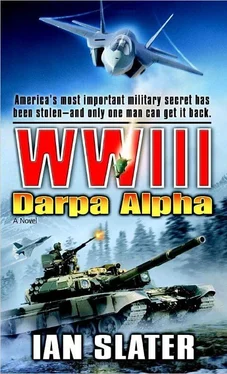“That better not be bullshit,” the general snapped without a trace of humor, never more serious in his life. “What do you mean? Trenches?”
Ilya was in a frantic charade, and he, like Freeman, had never been more serious in his life.
“Don’t try to think of the word,” Lee told Ilya. “It’ll only go farther away.” But apparently the thought of what the admiral would do to him if he didn’t make it clear only heightened the prisoner’s anxiety in his search for the English word. In desperation, he ceased his shoveling motion, and instead gave Lee the word in Russian. “Fonar.”
“Flashlight?” said Lee.
“Da!” said Ilya, making as if he was walking through a—
“Tunnel!” said Freeman.
“ Da! Tunnels! Yes, Admiral. Tunnels.”
“How many?”
“Three.”
“Incoming!” warned Aussie. A tremendous crash of steel ripping into timber followed. Everyone was down for cover except Freeman, grabbing Ilya by the lapel. “Where are the tunnels? Mother of—” He remembered the vapor coming from the high ground, vapor that had no smell. Heating vents! ABC’s weapons were being made underground!
Freeman pointed his H K 9 mm sidearm down at the ground. “Down there, yes?”
“Yes.”
“Entrances?” Freeman asked next. “Johnny, ask him if there’s one entrance, two, how many? An entrance for each tunnel?”
Ilya, realizing that information was his only salvation, was now speaking at such a rate that Lee had to slow him down.
“He says that for security reasons there’s only one main entrance for all three tunnels, and this is deep under the H-block, under the administration offices.”
“Is it North Koreans who are building the tunnels?” Freeman asked.
“Da, General.” With Boris supine beside him in the snow, Ilya was suddenly a gold mine of information. The gist of what he was saying was that the North Korean Communists who, as Freeman and anyone with even a passing acquaintance with North Korea knew, had watched American air supremacy over Korea in awe during the war of 1950–53, had also realized that in future wars, the only way for industry of any kind to survive American air-power would be to do as their North Vietnamese comrades had done in Cu Chi, that is, to burrow underground, deep underground, so deep that their military garrisons and factories couldn’t be penetrated by the American bunker-busters that had laid waste to Saddam Insane’s regime. What Ilya was also explaining was that in exchange for desperately needed foreign currency, the North Koreans’ tunnelers extraordinaire had been engaged by ABC to do the dirty “hard yakka” labor, as Aussie would have called it, of burrowing deep into one of the rock spars that speared out into the marshes from the base of the nearby Zapadnyy Siniy Mountains, the deep missile assembly and storage plant located ninety feet underground and heated by harnessing the hot spring conduits that vented in and about Lake Khanka’s marshes.
The crash of artillery rounds from the creeping, rather than target-specific, barrage had now passed beyond the wood, but had the enemy armor done the same?
“Can you hear any armor?” the general asked Lee, aware that his own hearing was deficient in what he had described to Margaret as the high, birdsong “trill and squeak range.”
“No, sir,” answered Lee. “I don’t know what’s going on.”
Freeman’s intuition told him something particularly troubling was afoot. Was ABC’s rebel infantry following the tank? And had they now spread out, moving stealthily through the sea of reeds toward the last radio spot? If so, this meant the Russians would have to pass by the wood before they reached the SOT farther west from which he had radioed Aussie in the wood.
For now, despite all his impatience to find the tunnels — if Ilya was telling the truth — the general knew they would have to find the tank. In the event of a second wave, a tank could destroy as many helos as it had rounds, killing a hovering Stallion with one shot from its main gun, its coaxial 12.7 mm heavy machine gun obliterating any of the troop carrier’s surviving marines.
“Damn!” said Freeman. He whipped out a small notebook from his thigh pocket and a small, flexi-grip indelible pencil that was firm enough to make a note with but not hard enough to be a deadly piece of shrapnel, as hard plastic or alloyed ballpoint pens were prone to become when their owners were hit. In Iraq, on the day Aussie had shot the bomb-belted “woman” running at him with little Blue Eyes, Aussie had seen a Brit sapper who’d lost an eye because a plastic ballpoint pen had disintegrated when he’d been nicked at chest level by a round from a terrorist’s AK-47. The plastic pen had shattered, but its “ball” had perforated the Brit’s eyeball, also taking out the optic nerve.
“Draw me a picture of the entrance,” Freeman told Ilya. “Any lie, you understand — propaganda bullshit — and you die, Ilya. Understand?”
Johnny Lee told Ilya the same thing in Russian, just to make sure.
The Russian, left hand trembling, though less now than it had been when the general had shot Boris, began drawing a diagram of the H-block building, telling Freeman that it was very cold inside it. “No warming,” Ilya told them, “so it does not show on satellites.”
“Ah,” Freeman said, “that’s why it doesn’t give off a heat signature for the satellites’ IR lens.”
“Everyone in the tunnels,” said Ilya, “wears down-filled Gore-Tex. You know Gore-Tex?”
“Everyone knows Gore-Tex,” said Freeman. “Show me something I don’t know. Show me where the tunnel entrance is.”
“Okay, Ad — General. I’m telling you truth now. No propaganda bullshit.”
“You’d better be, son, or you can join Boris.”
If the Russian thought the conversation between his captor and himself was going to produce any kind of Stockholm effect, his captor coming around to understanding why he and Boris, in the chaos of post — Cold War Russia, had thrown in their lot with ABC and helped kill innocent Americans for money, it wasn’t going to happen. There was no room in Freeman’s mind for these slaughterers of civilians. Freeman glanced through the white blobs of snow-covered bush at the wood’s perimeter out at the fog-blanketed whiteness of the reeds, anxious to see Melissa Thomas and the three other marines returning in the Hummer. Either that or the sweet-sounding swish of a TOW missile en route to enemy armor.
He glanced back down at Ilya’s drawing, showing three tunnels ninety feet below the surface accessed by elevator from the H-block. At the base of the elevator there was a large open area from which the tunnels branched and which was sealed off from the elevator shaft by large double doors. The tunnels themselves were about ten feet in diameter and six feet apart and ran parallel to one another for a distance of about three hundred feet. Thru-ways that connected the tunnels were spaced at fifty-foot intervals.
“Ask him,” Freeman told Lee impatiently, “what the arrangement is in each tunnel. What’s being made?”
Ilya, sensing the general’s agitated mood, responded quickly. He labeled the three tunnels “A, B, C,” for Abramov, Beria, and Cherkashin respectively, explaining to Lee that one was for installing missile motors, the second for electronics, anti-infrared guidance, et cetera, and the third tunnel was for the installation of warheads.
“Where’s the exit?” asked Freeman.
“Entrance is also exit.”
“That’s dumb. You go ninety feet underground and the tunnels run for three hundred feet. What if there’s fire?”
“Exit still being dug by Koreans here.” Ilya pointed to the end of the three fingerlike tunnels where they converged in a fifty-foot-diameter area. “Same size as the entrance.”
Читать дальше












